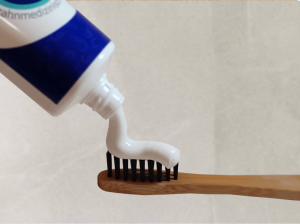
Magazine

VINATO Magazine
Why with fluoride?

In the 1930s, researchers discovered that children who drank fluoridated water were significantly less likely to develop tooth decay. As a result of this discovery, the first fluoride toothpaste was developed in the United States in the 1950s. Since then, toothpaste with fluoride has been the most effective tool in the fight against tooth decay. Nevertheless, controversial discussions about the use of toothpaste containing fluoride have become increasingly evident in recent years.
Is fluoride in toothpaste harmful?
Rumors have been circulating for some time that toothpaste without fluoride is said to be better. However, these rumors are based on a mix-up.
What are fluorides?
Fluorides are formed when the gaseous element fluorine reacts with other chemical substances. A common misconception is that fluorides are also considered toxic due to the toxic properties of fluorine gas. In reality, however, fluorine gas is highly corrosive and toxic, while fluoride, which is a compound of fluorine and another element such as sodium, loses its toxic properties. Fluoride salts, which also occur naturally in the human body, are also contained in table salt and as a trace element in black tea or drinking or mineral water in different, mostly small doses.
Does fluoride in toothpaste make you sick?
No, toothpaste with fluoride does not make you sick. In fact, toothpaste with fluoride may be the most effective at preventing tooth decay and strengthening tooth enamel. In its guidelines from April 2013, the German Society for Dental, Oral and Maxillofacial Medicine (DGZMK) expressly recommends toothpastes containing fluoride. The fluoride contained in toothpaste is an important component of dental health and can help make tooth enamel more resistant to bacteria and acids.
However, there are concerns that fluoride can be harmful. However, this is only the case if large amounts of it are taken. According to Ökotest magazine, an adult weighing 70 kg would have to ingest at least 350 mg of fluoride to notice the first signs of poisoning. This would mean that he would have to swallow the contents of about three tubes of toothpaste. In this case, the body would react with nausea or headaches. A health hazard from toothpaste with fluoride is therefore unrealistic as long as the recommended dosages are observed and the toothpaste is not swallowed.
In Germany, the fluoride content in toothpaste is regulated by law and may not exceed 0.15 percent, and in toothpaste for children only a maximum of 0.05 percent. It is therefore important for parents to supervise their children and ensure they are using the recommended amount of toothpaste. Young children tend to put more toothpaste on their toothbrush than is necessary. In this context, too high a dose of fluoride can cause unwanted discolouration on the surfaces of the teeth, which can appear brownish.
Is fluoride carcinogenic?
To date, there is no scientific evidence that fluoride is carcinogenic. Many studies have been conducted to investigate the potential health effects of fluoride, including cancer, but to date there is no conclusive evidence that fluoride causes cancer. The World Health Organization (WHO) has confirmed that there is no association between the use of fluoride in dental care products and an increased risk of cancer. In countries where fluoride is added to drinking water, there are also no signs of an increase in cancer cases due to the fluoride content in drinking water.
Toothpaste without fluoride
However, there are also people who do not want to use fluoride toothpaste for various reasons. For example, some prefer a more natural alternative, while others have sensitive teeth or allergies that prevent them from using fluoride. In such cases, a fluoride-free toothpaste may be a suitable option. However, it is important to note that a fluoride-free toothpaste is not as effective at preventing tooth decay as a toothpaste that contains fluoride. If you want to successfully protect yourself against caries without fluoride, you have to review your diet and dental care habits, and in particular significantly reduce your sugar consumption.
Conclusion:
The small amount of fluoride in toothpaste is not harmful and may even help prevent tooth decay and other dental diseases. Overall, fluoride toothpaste is a safe and effective way to support oral hygiene and promote dental health. There’s no need to worry as long as you stick to the recommended dosages and don’t swallow the toothpaste.
A contribution from the editors of the company Imexnado GmbH
Sources:
- Focus online: www.focus.de
- Dentalmagazin: www.dentalmagazin.de
- Zahnarztpraxis im Lehel: www.zahnarzt-lehel.de
Downloads:

